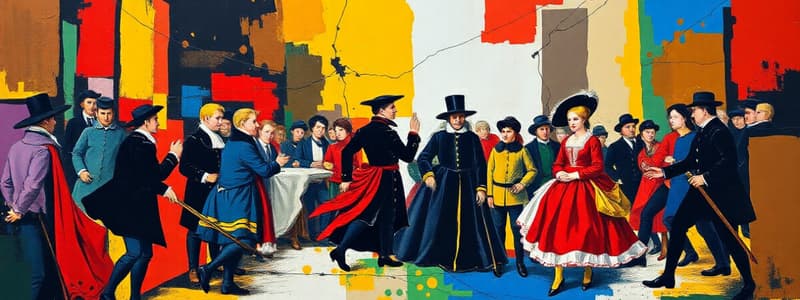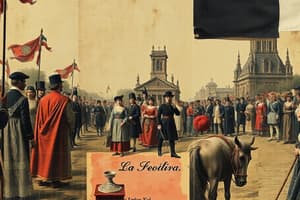Podcast
Questions and Answers
¿Qué marcó la Revolución Francesa?
¿Qué marcó la Revolución Francesa?
La Revolución Francesa marcó una transición de un régimen exclusivo a uno más inclusivo.
¿Cuál fue el lema de la Revolución Francesa?
¿Cuál fue el lema de la Revolución Francesa?
"Libertad, igualdad y fraternidad"
¿Qué existía dentro de la sociedad francesa?
¿Qué existía dentro de la sociedad francesa?
Grandes disparidades sociales.
¿Qué provocó una hambruna generalizada en Francia?
¿Qué provocó una hambruna generalizada en Francia?
¿Qué buscaba la burguesía?
¿Qué buscaba la burguesía?
¿Con qué chocaba el poder absoluto del monarca?
¿Con qué chocaba el poder absoluto del monarca?
¿Qué eran los Estados Generales?
¿Qué eran los Estados Generales?
¿Quiénes gozaban de privilegios y estaban exentos de pagar impuestos?
¿Quiénes gozaban de privilegios y estaban exentos de pagar impuestos?
¿Quién se declaró representante de la nación, ya que no tenía privilegios?
¿Quién se declaró representante de la nación, ya que no tenía privilegios?
¿Qué formaron los miembros del Tercer Estado?
¿Qué formaron los miembros del Tercer Estado?
¿Qué ocurrió el 14 de julio de 1789?
¿Qué ocurrió el 14 de julio de 1789?
¿Qué simbolizó el asalto a la Bastilla?
¿Qué simbolizó el asalto a la Bastilla?
¿Qué se aprobó el 5 de agosto de 1789?
¿Qué se aprobó el 5 de agosto de 1789?
¿Quién redactó la Declaración de los Derechos de la Mujer?
¿Quién redactó la Declaración de los Derechos de la Mujer?
¿Qué promulgó la Asamblea en septiembre de 1791?
¿Qué promulgó la Asamblea en septiembre de 1791?
¿Qué proclamó y abolió la Convención Nacional?
¿Qué proclamó y abolió la Convención Nacional?
¿A quién ordenó ejecutar la Convención Nacional en la guillotina?
¿A quién ordenó ejecutar la Convención Nacional en la guillotina?
¿Qué representaban los Girondinos?
¿Qué representaban los Girondinos?
¿Qué buscaban los Jacobinos?
¿Qué buscaban los Jacobinos?
¿Quién fue el líder destacado de los Jacobinos?
¿Quién fue el líder destacado de los Jacobinos?
¿Qué implementó Robespierre?
¿Qué implementó Robespierre?
¿Qué marcó el fin del Terror?
¿Qué marcó el fin del Terror?
¿Qué permitió la debilidad del gobierno?
¿Qué permitió la debilidad del gobierno?
¿En qué año dio Napoleón Bonaparte un golpe de estado?
¿En qué año dio Napoleón Bonaparte un golpe de estado?
¿Durante cuántos años lucharon los franceses por mejores condiciones de vida?
¿Durante cuántos años lucharon los franceses por mejores condiciones de vida?
¿En qué categoría se encuentra la división del poder en ejecutivo, legislativo y judicial como un logro de la Revolución?
¿En qué categoría se encuentra la división del poder en ejecutivo, legislativo y judicial como un logro de la Revolución?
¿Qué categoría incluye la abolición del Antiguo Régimen y las monarquías absolutas como un logro de la Revolución?
¿Qué categoría incluye la abolición del Antiguo Régimen y las monarquías absolutas como un logro de la Revolución?
¿En qué categoría se enmarca la mejor distribución de la riqueza como un logro de la Revolución?
¿En qué categoría se enmarca la mejor distribución de la riqueza como un logro de la Revolución?
¿Dónde nació Napoleón Bonaparte?
¿Dónde nació Napoleón Bonaparte?
¿Qué buscó Napoleón?
¿Qué buscó Napoleón?
¿Qué transformó el Código Civil (Código Napoleónico)?
¿Qué transformó el Código Civil (Código Napoleónico)?
¿A qué está relacionado el término 'Pueblo' en tiempos modernos?
¿A qué está relacionado el término 'Pueblo' en tiempos modernos?
¿Qué comparte una 'Nación'?
¿Qué comparte una 'Nación'?
¿Qué afirman los chovinistas?
¿Qué afirman los chovinistas?
¿Qué reclaman los irredentistas?
¿Qué reclaman los irredentistas?
¿Qué significó la derrota de Napoleón en Europa?
¿Qué significó la derrota de Napoleón en Europa?
¿Qué se estableció con el Congreso de Viena?
¿Qué se estableció con el Congreso de Viena?
¿Qué proyectos estaban claramente establecidos para 1848?
¿Qué proyectos estaban claramente establecidos para 1848?
¿Qué buscó rescatar el movimiento cultural del Romanticismo?
¿Qué buscó rescatar el movimiento cultural del Romanticismo?
¿Qué creían los románticos que reflejaban las tradiciones?
¿Qué creían los románticos que reflejaban las tradiciones?
¿Dónde se inició la Primavera de los Pueblos en 1848?
¿Dónde se inició la Primavera de los Pueblos en 1848?
¿A qué se opuso la Primavera de los Pueblos?
¿A qué se opuso la Primavera de los Pueblos?
¿Qué lograron Italia y Alemania mediante procesos similares?
¿Qué lograron Italia y Alemania mediante procesos similares?
Flashcards
French Revolution
French Revolution
The French Revolution marked a transition from an exclusive regime to a more inclusive one, fighting for the liberation of the people from the oppressive monarchy.
Estates General
Estates General
Assembly convened by the king in times of crisis, composed of three estates: Clergy, Nobility and Third State.
Storming of the Bastille
Storming of the Bastille
Citizens of Paris stormed the Bastille, a notorious prison. Symbolized the liberation of the people against oppression and tyranny.
Declaration of the Rights of Man and of the Citizen
Declaration of the Rights of Man and of the Citizen
Signup and view all the flashcards
Reign of Terror
Reign of Terror
Signup and view all the flashcards
End of the Revolution
End of the Revolution
Signup and view all the flashcards
Napoleonic Code
Napoleonic Code
Signup and view all the flashcards
People & Nation
People & Nation
Signup and view all the flashcards
The Spring of Nations
The Spring of Nations
Signup and view all the flashcards
Italian & German Unification
Italian & German Unification
Signup and view all the flashcards
Study Notes
- Revolutions, Empires, and Colonization are significant historical processes
The French Revolution
- The French Revolution marked a shift from an exclusive regime to a more inclusive one
- It represented the people's fight for liberation from the oppressive monarchy with the motto "Liberty, equality, and fraternity"
Causes of the French Revolution
- Social inequality existed with great disparities within French society
- An economic crisis saw France experiencing a period of instability
- Famine occurred due to a series of bad harvests
- The bourgeoisie's aspirations sought political power in line with their economic influence
- The absolute power of the king clashed with the idea of the separation of powers
The Estates-General and the National Assembly
- The Estates-General was an assembly convened by the king in times of crisis, composed of three estates
- The clergy was one of the estates
- The nobility was one of the estates
- The Third Estate comprised burghers, artisans, and peasants
- The clergy and nobility enjoyed privileges and were exempt from paying taxes
- The Third Estate declared itself the representative of the nation, as it had no privileges
- Members of the Third Estate formed the National Assembly
The Storming of the Bastille
- On July 14, 1789, citizens of Paris stormed the Bastille, a notorious prison
- This event symbolized the liberation of the people against oppression and tyranny
Declaration of the Rights of Man and of the Citizen
- On August 5, 1789, the Declaration of the Rights of Man and of the Citizen was approved, establishing fundamental principles based on equality, liberty, and fraternity
- Marie Gouze wrote the Declaration of the Rights of Women due to the exclusion of women in the original declaration
Constitutional Monarchy
- The Assembly enacted the Constitution in September 1791, structuring France as a constitutional monarchy
- The king's power was limited through the separation of powers
- Executive power was held by the King
- Legislative power was held by the Assembly
- Judicial power was held by elected magistrates
The National Convention
- The monarchy was abolished, the republic proclaimed, and Louis XVI and Marie Antoinette were ordered to be executed by guillotine
- It was divided into two groups
- The Girondins represented the upper bourgeoisie, defended constitutional monarchy, and restricted suffrage
- The Jacobins sought radical reforms, wanted to overthrow the king, and establish a republic, and their prominent leader was Maximilien de Robespierre
The Reign of Terror
- Robespierre implemented the Reign of Terror, in which thousands of French citizens were persecuted and executed in the guillotine for alleged counter-revolutionary activities
- Robespierre was executed, accused of establishing a dictatorship, marking the end of the Terror
End of the Revolution
- The weakness of the government allowed Napoleon Bonaparte to carry out a coup in 1799, ending the French Revolution
- The French people fought for better living conditions and changes in government for 10 years, laying the foundations for more liberal and democratic systems worldwide
Achievements of the Revolution
- Division of power into executive, legislative, and judicial branches was a political achievement
- Separation between Church and State was a political achievement
- Abolition of the Old Regime and absolute monarchies was a social achievement
- Recognition of human and social rights was a social achievement
- The rise of the middle class as a new social power was asocial achievement
- Improved distribution of wealth was an economic achievement
Napoleon and the Napoleonic Empire
- Napoleon Bonaparte was born in Corsica
- He was Emperor of the French, linked to the nation, its citizens, and the legacy of the Revolution
- Napoleon sought alliances with the Pope, the Church, and European monarchies while trying to dominate Europe directly or indirectly
Consequences of Napoleonic Rule
- The spread of enlightened ideas about merit, liberty, and rights in Europe ended many privileges and traditions
- Adoption of the Civil Code (Napoleonic Code) transformed the concept of private property and legal rights
People, Nation, and Nationalism
- People, in modern times, are related to citizenship and participation
- Nation is a human group that shares history, traditions, territory, language, and collective identity
Types of Nationalism
- Chauvinists assert that their nation is superior to others
- Irredentists claim territories belonging to other states as part of their nation
Context of Nationalism: Restoration and New Revolutions
- In Europe, the defeat of Napoleon meant the triumph of the Restoration, that is, the reestablishment of monarchies
- The Congress of Vienna established the Holy Alliance, an agreement among the great empires to prevent revolutionary changes
- A system of alliances was created to maintain peace and stability, preventing new revolutions
Between Nationalist Revolution and the Origins of Socialism
- By 1848, the political, economic, and social projects of socialism were clearly established
- The cultural movement of Romanticism sought to rescue oral traditions and popular customs, especially in rural communities
- Romantics believed that these traditions reflected the authentic soul of each town
1848: The Spring of Nations
- In 1848, the Spring of Nations took place, beginning in Naples
- It opposed absolute monarchies, the Holy Alliance, and the peace system imposed in Vienna
National Unifications: Italy and Germany
- Italy and Germany achieved their unification through similar processes
- A promoter kingdom existed (Kingdom of Prussia in Germany and Kingdom of Piedmont in Italy)
- There were wars and international conflicts
- There were nationalist movements and a sense of unity among the population
Studying That Suits You
Use AI to generate personalized quizzes and flashcards to suit your learning preferences.



